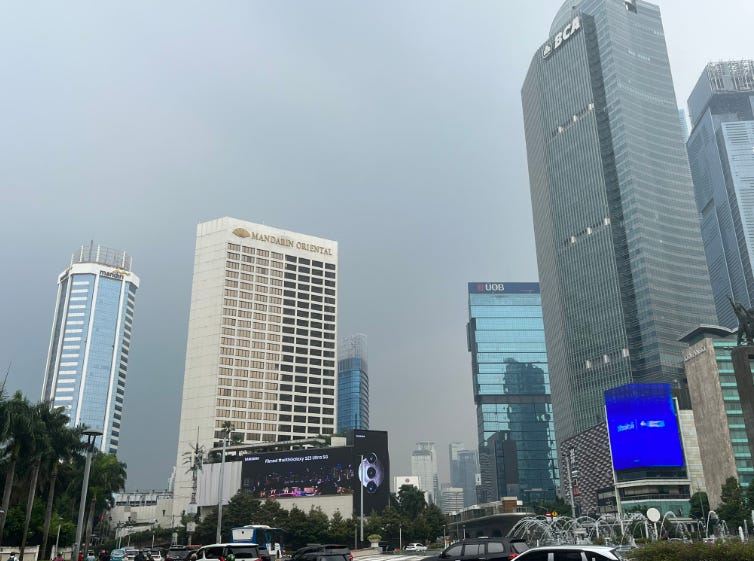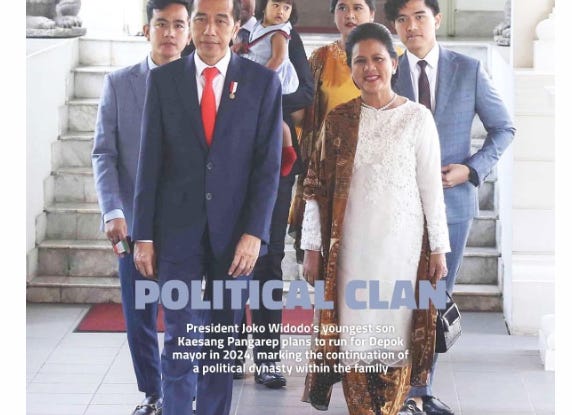ASEAN Democracy on the edge. Dynast[ies] Strikes Back
If president can secure nomination for his son, how far will he go do secure victory? Jokowi's ambitions to maintain influence after 2024 amid gigantic new capital city [must finish], make a bad image
Jakarta, 5.55am
Hambalang athlete complex cost-of-corruption already around 800 billion rupiah [around USD 51 million], and this painful - legacy from former President SBY [Susilo Bambang Yudhoyono] haunted current President ‘Jokowi’ Joko Widodo.
Not yet ‘official statement’ from several embassies in Jakarta to build again new embassy in new capital city NUSANTARA, because several countries already renovate-invest some USD50 million - USD350 million to bigger compound [US, Australia, France, UK]. Estimate cost for at least until 2045 for new capital city USD700 Billion. Annual Indonesia budget only USD155-160 billion. Jokowi's ambitions to maintain influence after 2024 amid gigantic new capital city [must finish, whatever cost], make a bad image for him. 5 weeks ago, another candidate, Anies, signaled that the construction of the new capital city would not continue, if he [with Abdul Muhaimin Iskandar] win the election 2024.
Deepening Indonesia's patronage and dynastic politics would be at odds with democratic reforms the world's third-largest democracy has achieved since throwing off authoritarian rule a quarter-century ago [Soeharto’s fall, 1998].
Prabowo ‘‘Yes, we admit we are dynasty. Dynasty for the poor people.’’
The agreement between Prabowo and Gibran to be run in ELECTION 2024, is strategic-cooperation, directly or indirectly, under 3 dynasties, ‘house of Cendana / Soeharto’ [ex Prabowo spouse], house of Djojohadikusumo [was very dominant on PRRI movement, one of revolutionary movement just year after Indonesia Independence Day], and of course ‘house of Widodo.’
Joko Widodo hedging his bets between the top two candidates and nurturing a dynasty to ensure a lasting influence. Ganjar - Mahfud MD, and Prabowo - [Jokowi’s son] Gibran. According to Romahurmuziy [former corruptor-but-already freed, PPP high rank member], Jokowi stubborn to giving advice for Ganjar’s team, mentioned name Mahfud MD as VP candidate is the best choice for Ganjar [in Jokowi’s mind].
Jokowi, as PDIP cadre [in Indonesia very famous, with Indonesian language ‘PETUGAS PARTAI’] lent support to Ganjar Pranowo, deploying teams and volunteer groups to work on his campaign, four sources said.
As recently as September, the president appeared on stage at a national PDI-P event, telling the crowd he had advised Ganjar to start planning for the day he would lead the nation.
"I whispered to him, 'After you're inaugurated - a day after you're inaugurated - you have to take care of food self-sufficiency. Don't take too long'," Jokowi said.
While Jokowi, as he is known, has appeared to back the contender from the ruling party, he has also been covertly marshalling support for controversial ex-general Prabowo Subianto Djojohadikusumo to run Southeast Asia's largest economy.
Jokowi of course doesn’t want to marshalling support for Anies - Muhaimin, both [especially Anies] don’t care about budgeting of new capital city NUSANTARA.
Both leading candidates have indicated they will continue Jokowi's economic policies, signalling continuity for flagship projects like moving the capital away from Jakarta and developing an electric vehicle industry in the trillion-dollar G20 economy.
President Joko Widodo is likely to remain popular. This may usher in a period of politics that are dominated by a new generation, not the elites of the country's authoritarian era. At least until last August 2023, from 5 survey poll, satisfied and very satisfied for Jokowi works reach [in range] 80-90 percent in aggregate. This is very huge, because former President SBY, in year 9, just get [satisfied percentage] 30-35 percent.
Not yet new polls for same thing about Jokowi after Gibran to be VP with Prabowo. Jokowi’s legacy in peril as he uses close relatives to ensure his security after elections next year. With one out of three options for next Valentine 2024, [Prabowo-Gibran] intensifying the focus on a family dynasty emerging in the world’s third-largest democracy.
During the transfer of power on Oct. 21 next year, he will certainly want to make sure his achievements will help his successor bring the republic closer to justice and prosperity for all. Jokowi, whose presidency has been characterized by his focus on infrastructure development, social welfare programs and economic growth, has overseen a period of remarkably stable growth of 5 percent each year of his term, except in 2020 when the Indonesian economy contracted as a result of the global pandemic.
Indonesia is projected to maintain the trend in the final year of Jokowi’s term, which will provide the new government with the much-needed fundamentals and confidence to withstand global uncertainties in the years to come. It is safe to say that Jokowi has fared quite well on the economic front, as evident in the widespread recognition both domestically and internationally. His promise to accelerate growth by 7 percent during the presidential campaign back in 2014, while simply a gimmick to lure voters, would never come true, but it reflected his guarded optimism and determination.
Unlike former presidents Megawati and Susilo Bambang Yudhoyono, of the Democratic Party, Jokowi did not own his own political party but was merely a party official when he became Indonesia’s seventh president in 2014. Nine years after his election, Jokowi has exceeded them by becoming the only president with two members of his family — Gibran and son-in-law Bobby Nasution — respectively serving as mayors of the cities of Surakarta and Medan.
Jokowi needs to preserve his family’s legacy, particularly given unfinished businesses such as moving the country’s capital from Jakarta to East Kalimantan. In this context, Gibran’s nomination for the vice presidency would also be critical in efforts to maintain Jokowi’s political dynasty.
The choice of PSI over PDI-P as Kaesang’s political vehicle merits attention. PSI failed to pass the 4 per cent national parliamentary threshold in 2019, but was rewarded for its loyalty to Jokowi with the appointment of a PSI member as a deputy minister. PSI also frequently challenges PDI-P. It nominated Ganjar Pranowo — a seasoned PDI-P cadre — as its presidential candidate before backtracking and signalling support for the campaign of Defence Minister Prabowo Subianto.
PSI does not yet have an internal hegemonic politician in its ranks. Other parties have their own bosses or promotion mechanisms that would prevent Kaesang from taking the centre stage right away. In short, while PSI may not be the ideal party for Kaesang, it is the only party that is readily available to be transformed into a political vehicle for the Jokowi family should they receive disciplinary sanctions from PDI-P in response to Gibran joining Prabowo’s ticket.
The limits of PDI-P’s tolerance are being tested. As a PDI-P cadre, Jokowi has expressed his support for the party’s presidential candidate, former governor of Central Java Ganjar Pranowo. But his frequent appearances alongside Prabowo and the moves by some Jokowi volunteer groups to endorse Prabowo seem to substantiate speculation that the president actually favours his defence minister’s candidacy.
If Gibran does indeed become Prabowo’s vice presidential candidate, the potential for tension between the two camps will likely increase, and potentially destabilise Indonesia’s political climate over the coming months. Jokowi and PDI-P are locked in a mutual hostage situation. Jokowi still needs PDI-P to ensure his government’s stability in his final year in office. On the other hand, PDI-P needs Jokowi as an electoral magnet for the Valentine-February 2024 legislative elections. Open hostility between the two camps would undoubtedly impede their plans for upcoming elections. Whoever blinks first loses.
Currently, Jokowi can potentially mobilise millions of votes for the person or party he approves of.
Even though Jokowi may not be a party leader, he has a phalanx of loyal volunteers — most of whom do not identify with a particular party and will only choose their preferred candidate when he provides clear direction of support. For PSI, merely having the President’s son as its chairman makes it expect to reap coattail effects, bettering its chance of winning the 4 per cent of the popular vote required to be awarded seats in parliament.




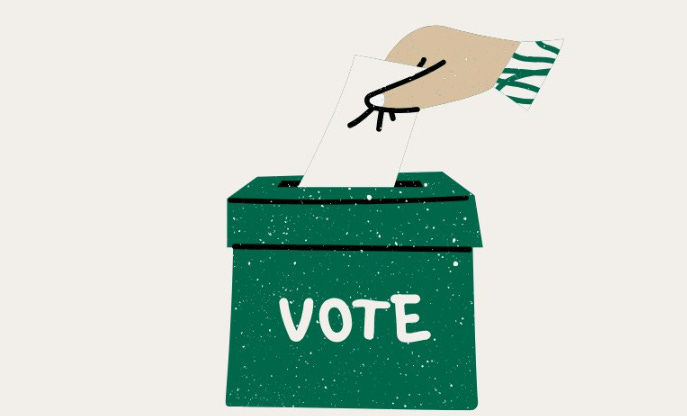
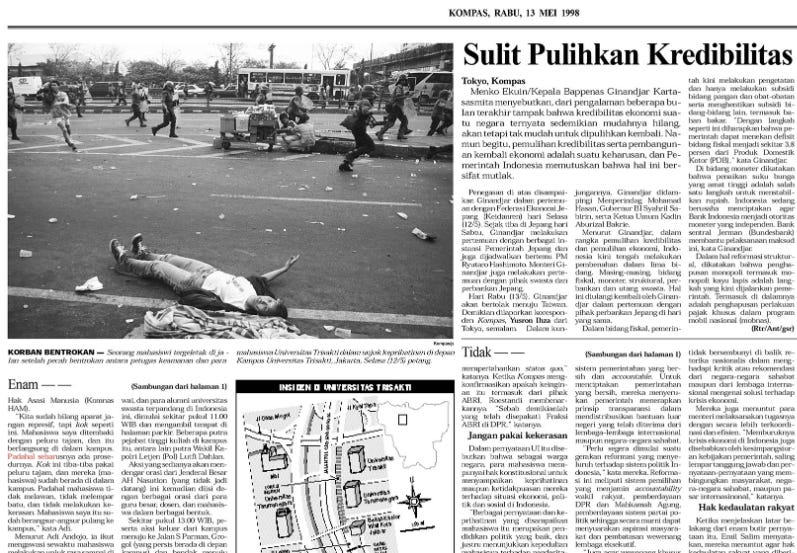
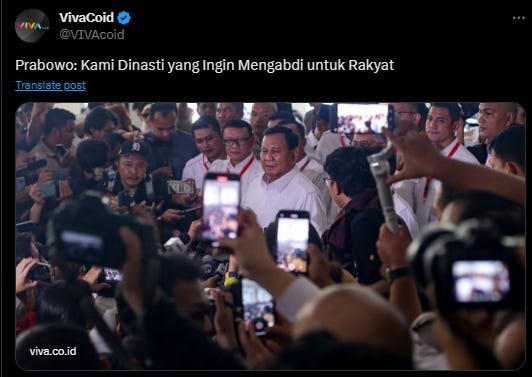
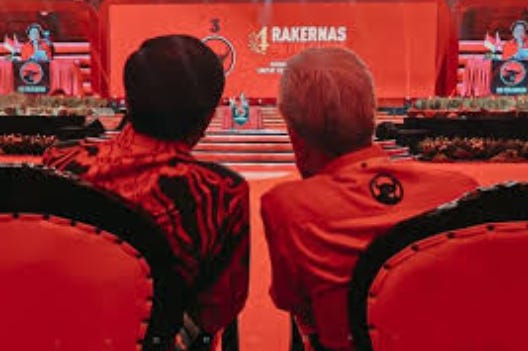
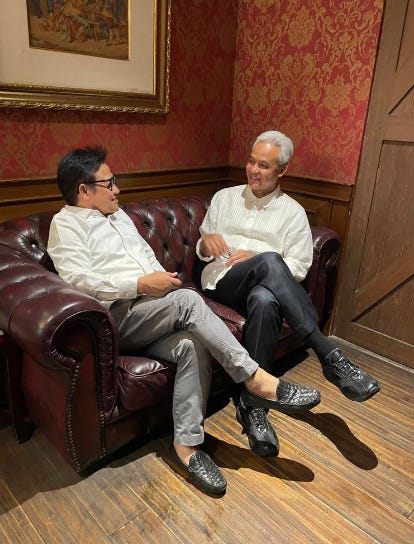

![[BREAKING] 36 Years Old Gibran, eldest son of PDIP’s - President Jokowi, tapped as [Minister of Defence] Prabowo’s running mate for Election 2024](https://substackcdn.com/image/fetch/w_1300,h_650,c_fill,f_auto,q_auto:good,fl_progressive:steep,g_auto/https%3A%2F%2Fsubstack-post-media.s3.amazonaws.com%2Fpublic%2Fimages%2F24efe7df-926b-4213-a1ae-959b48ec8b89_682x341.png)
